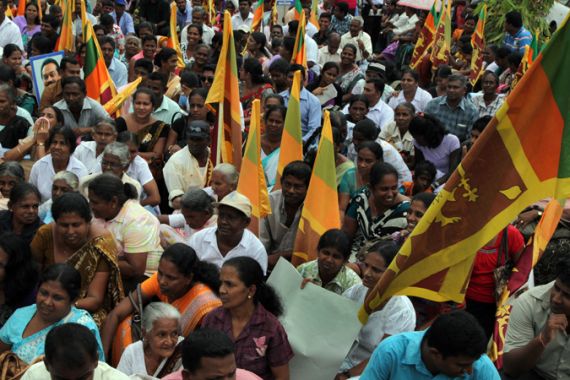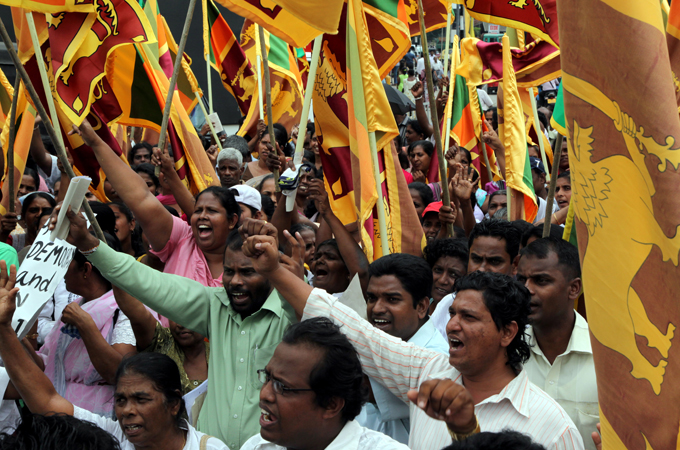Sri Lankans protest UN war crimes probe
Thousands demonstrate at US embassy in Colombo after Washington asks UN to investigate alleged crimes during civil war.

 |
| The protesters said they view the UN resolution as an interference in Sri Lanka’s internal affairs [EPA] |
Thousands of Sri Lankans have rallied to condemn a United Nations resolution that calls on the government to look into alleged war crimes during the last days of the country’s civil war.
The protesters, who have been joined by monks, continued demonstrating outside the US embassy in the capital Colombo on Thursday. The rallies began when Washington said earlier this week that it was planning to bring the resolution before the UN rights council in Geneva.
The government, dominated by ethnic Sinhalese, arranged the protests across the country against the resolution, which it calls interference in Sri Lanka’s affairs.
At least 10,000 people marched in Colombo on Thursday to denounce the proposed resolution. Smaller groups met with UN, British, Norwegian and German officials to urge them not to support it.
Ethnic Tamil legislators, however, have asked the rights council to press the government to investigate alleged wartime abuses.
The legislators have demanded power sharing with their ethnic minority to prevent the country from sliding back into violence.
Sri Lanka’s civil war ended in 2009 when government troops crushed separatist Tamil Tiger rebels, known as the Liberation Tigers of Tamil Eelam (LTTE).
Both sides have been accused of committing war crimes during the final stages of the conflict.
Long-standing demand
Human rights organisations have said that up to 40,000 civilians perished in the final months of fighting in 2009, during which the Sri Lankan army is accused of shelling populated areas as well as hospitals and refugee camps.
Tamil legislators said they support the resolution, with the leader of the Tamil National Alliance, Rajavarothayam Sampanthan, saying the government has not shown a genuine interest in sharing power, despite promises made to the UN and other nations.
Power sharing remains a long-standing demand of ethnic minority Tamils. Sampanthan accused the military of bringing ethnic Sinhalese settlers into former war zones to alter the demographics.
“As the opportunities for post-war peace and reconciliation in Sri Lanka gradually slip away, the members of the UNHRC [UN Human Rights Council] just act urgently to prevent an ominous slide toward a recurrence of the tragedies of the past,” Sampanthan said in a statement on Thursday.
A UN panel has concluded that tens of thousands of civilians may have been killed in the final months of the civil war.
It said there were credible allegations against both government soldiers and Tamil Tiger rebels of serious human rights abuses, some of which could amount to war crimes.
The government’s own probe last year acknowledged that civilians had been killed, but said it was not due to any action by the security forces.
Television documentary
Meanwhile, Sri Lanka rejected as “baseless and unacceptable” a new documentary by Britain’s Channel 4 which suggested that the army executed the 12-year-old son of LTTE leader Velupillai Prabakharan after he surrendered.
The British news channel broadcast an account from a forensic expert on Wednesday who said Prabhakaran’s son appeared to have been shot at close range.
The video, “Sri Lanka’s Killing Fields: War Crimes Unpunished”, also claimed it had “damning new evidence” of abuses against civilians.
“The ministry categorically rejects the video as baseless and unacceptable,” the defence ministry said adding that Channel 4 had aired the documentary to defame Sri Lanka during a session of the UNHCR in Geneva.
In June, Channel 4 aired a documentary containing videos which it said amounted to evidence of war crimes by Sri Lankan soldiers during their final offensive against the LTTE.
Prabhakaran was killed at the end of an army offensive against the brutal rebel group which ended a 37-year-old civil war estimated to have cost up to 100,000 lives.